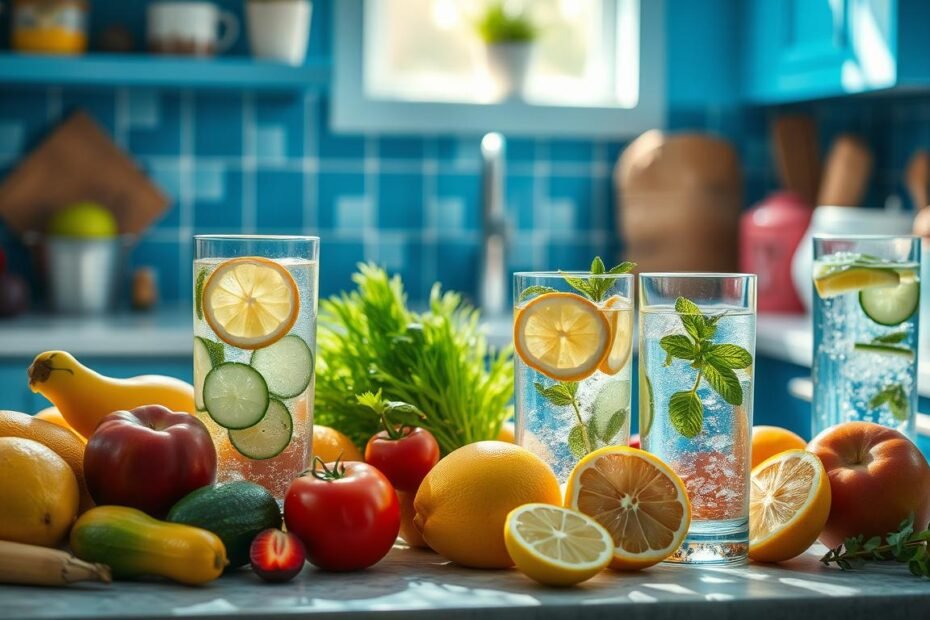Ever wondered why staying hydrated is key with diabetes? I’ve learned that it’s more than just drinking water. It’s a must for health management. Diabetes ups the risk of dehydration, so knowing how to stay hydrated is crucial1.
Diabetes changes how our bodies work. High sugar levels strain our kidneys, causing more trips to the bathroom and fluid loss1. That’s why staying hydrated with diabetes is vital for our health.
Dehydration can make blood sugar levels soar. In fact, it can raise them by 50-110 mg/dL or more2. That’s why I always talk about the importance of staying hydrated for diabetics. By keeping an eye on our fluid intake, we can keep our blood sugar stable and our bodies working right.
Key Takeaways
- Diabetes increases the risk of dehydration due to excess sugar in the blood
- Dehydration can cause significant spikes in blood sugar levels
- Proper hydration is crucial for managing diabetes
- Regular monitoring of blood glucose levels is recommended
- Drinking water throughout the day helps maintain hydration
- Certain beverages are better choices for people with diabetes
Understanding the Link Between Diabetes and Dehydration
I’ve learned that diabetes and dehydration are closely connected. People with diabetes face unique challenges when it comes to staying hydrated. Let’s explore why this happens and how to recognize the signs.
Why Diabetics Are More Prone to Dehydration
Diabetes can make you more likely to get dehydrated. High blood sugar levels make your body try to get rid of extra glucose through urine. This can lead to losing fluids. Studies show that staying hydrated is key for people with diabetes. It helps control blood sugar and manage insulin better3.
The Impact of Dehydration on Blood Sugar Levels
Dehydration can start a bad cycle for diabetics. Being dehydrated lowers your blood pressure, causing your body to release stress hormones. These hormones can make your blood sugar levels go up even more3. Research shows that even a little dehydration can affect how your body handles blood sugar in type 2 diabetes3.
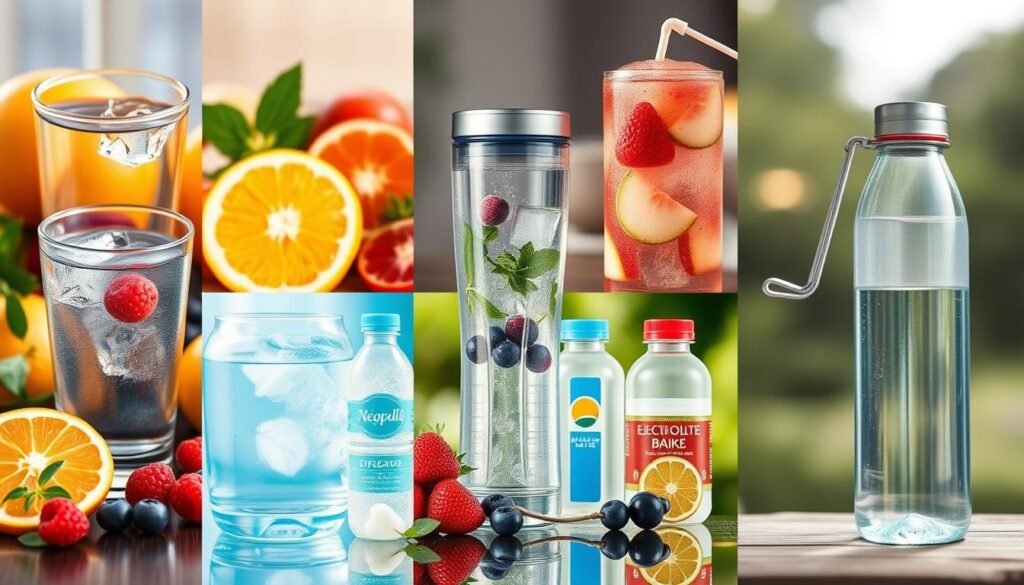
Recognizing the Signs of Dehydration in Diabetics
Knowing the signs of dehydration is key when you have diabetes. Mild signs include a dry mouth, thirst, headaches, and dark urine. Severe signs might be dizziness, feeling very tired, and muscle cramps4. In the worst cases, diabetic ketoacidosis can happen, causing dry skin, a flushed face, and even diabetic coma5.
To stay hydrated and avoid problems, women with diabetes should aim for about 6.5 cups of fluids a day. Men should aim for 8.5 glasses5. Avoiding dehydration is crucial for managing diabetes. It helps keep your blood sugar stable and keeps you healthy.
The Importance of Staying Hydrated with Diabetes
Staying hydrated with diabetes is key for good health and keeping blood sugar levels in check. It’s super important for us with diabetes. Our bodies use water a lot, making up 50% to 70% of our weight6.
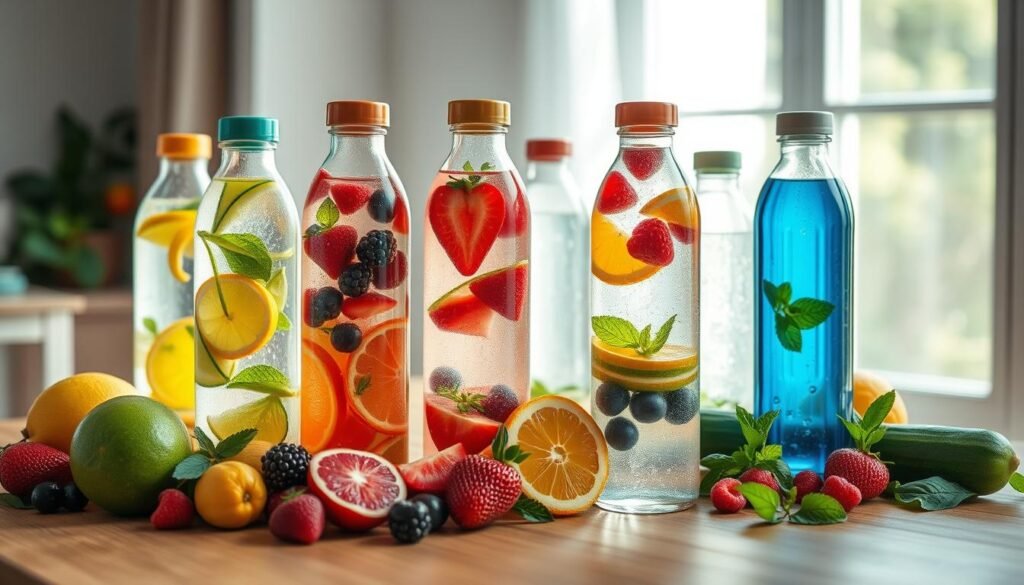
Drinking enough water helps control blood sugar. It also protects our kidneys, nerves, and heart from damage. It’s not just about drinking water; it’s about keeping our bodies balanced.
Dehydration can be risky for diabetics. It can cause confusion, a fast heartbeat, fainting, and even shock6. We need to watch for signs of dehydration like thirst, dark urine, dry mouth, dizziness, tiredness, and dry skin6.
“Water is life, especially for those of us managing diabetes. It’s not just about quenching thirst; it’s about nourishing every cell in our body.”
Our need for water changes due to different factors. Illnesses like fever, vomiting, or diarrhea can affect our hydration6. Hot weather and exercise can also make us lose water, so we need to drink more6.
For diabetic seniors, staying hydrated is harder. Some medicines make us urinate more or thirstier7. Also, unstable blood sugar levels can make it tough to hold onto water and feel thirsty7.
Being hydrated means more than just drinking water. It helps keep our body temperature normal, flushes out toxins, supports gut health, and protects our joints. It’s a big part of staying healthy, helping us live better, longer lives67.
Recommended Daily Fluid Intake for Diabetics
Drinking enough water is key for people with diabetes. It helps thin out the blood and keeps blood sugar levels in check8. Let’s look at how much water diabetics should drink and how to keep track of their hydration.
General Guidelines for Water Consumption
The Institute of Medicine recommends about 13 cups of water a day for men and 9 cups for women9. These are basic guidelines for managing diabetes with water. I suggest slowly upping your water intake, by about 8 ounces each week, until you hit your goal9.
Adjusting Fluid Intake Based on Individual Factors
Your body’s need for water can change due to your age, how active you are, your weight, and the weather9. Some health issues, like heart failure, might mean you need to drink less water. Always talk to your doctor for advice on how much water you should drink with diabetes.
Monitoring Hydration Levels
It’s important to keep an eye on how hydrated you are. Look for your urine to be clear or light yellow. Listen to your body’s thirst signals. Apps like Waterllama can help you track your water intake9. Drinking enough water helps control blood sugar by moving glucose and insulin around your body9.
| Factor | Impact on Hydration Needs |
|---|---|
| Age | Older adults may need more fluids |
| Activity Level | Higher activity = increased fluid needs |
| Weather | Hot weather increases fluid requirements |
| Body Weight | Higher weight may require more fluids |
By following these tips and keeping an eye on your hydration, you can handle your diabetes better. Drinking enough water helps your kidneys filter and get rid of blood sugar, which is good for managing diabetes8.
Best Beverages for Diabetics
Water is the top choice for diabetics. It’s key for managing diabetes. Our bodies are mostly water, showing its vital role10. But, plain water can be dull. That’s why I’ve found some tasty, sugar-free drinks for you.
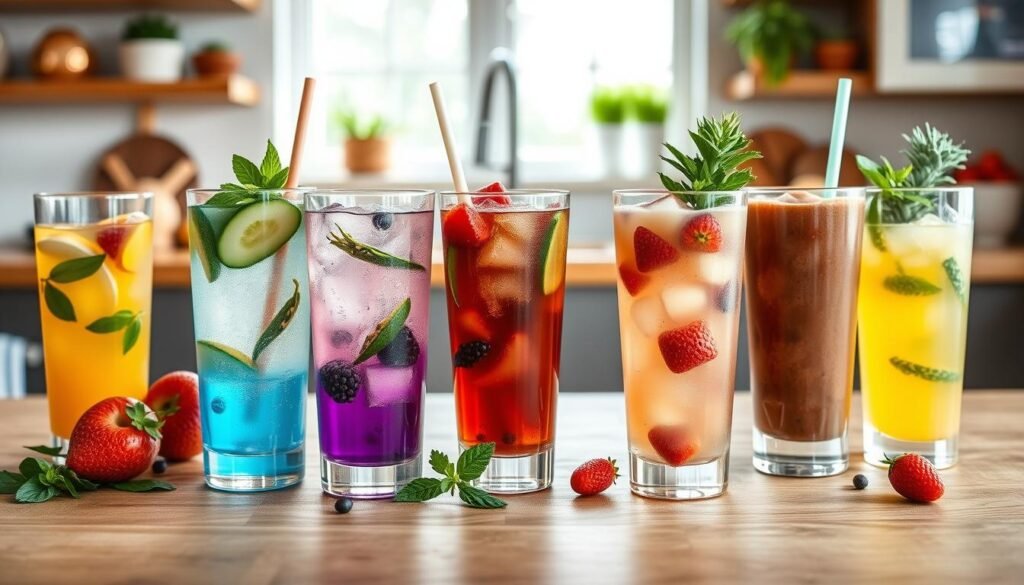
Herbal teas and unsweetened black tea are great picks. They taste good and can be enjoyed hot or cold. Coffee lovers, don’t worry! You can still have your coffee, just pick low-fat milk or alternatives.
Sparkling water is another great choice. Add cucumber, lemon, or mint for extra flavor10. These simple tweaks make staying hydrated fun and help with diabetes.
| Beverage | Benefits | Considerations |
|---|---|---|
| Water | Hydrating, zero calories | Add natural flavors for variety |
| Herbal Tea | Flavorful, potentially beneficial herbs | Avoid added sugars |
| Coffee | May lower type 2 diabetes risk | Limit additives, watch caffeine intake |
| Green Tea | May lower type 2 diabetes risk | Beneficial when consumed daily11 |
Limiting diet sodas is wise. They’re linked to metabolic syndrome and high blood sugar11. Regular sodas are also a no-go due to their sugar load – a can has about 40 grams of sugar11.
Hydration for diabetes is more than just what you drink. By picking these drinks and watching your intake, you’re on the path to better diabetes care.
Tips for Increasing Water Consumption
Staying hydrated with diabetes is key to keeping blood sugar levels in check. Here are some easy tips to help you drink more water and stay hydrated.
Setting Reminders and Creating Habits
To drink more water, I start my day with a glass of water. I also drink before meals. Carrying a reusable water bottle helps me remember to sip throughout the day.
It’s crucial to drink water all day, especially when it’s hot or I’m active12.
Flavoring Water Naturally
Water can get dull, so I add natural flavors. I use fruits, vegetables, or herbs to make it tasty. Cucumber slices, lemon wedges, or mint leaves are great choices.
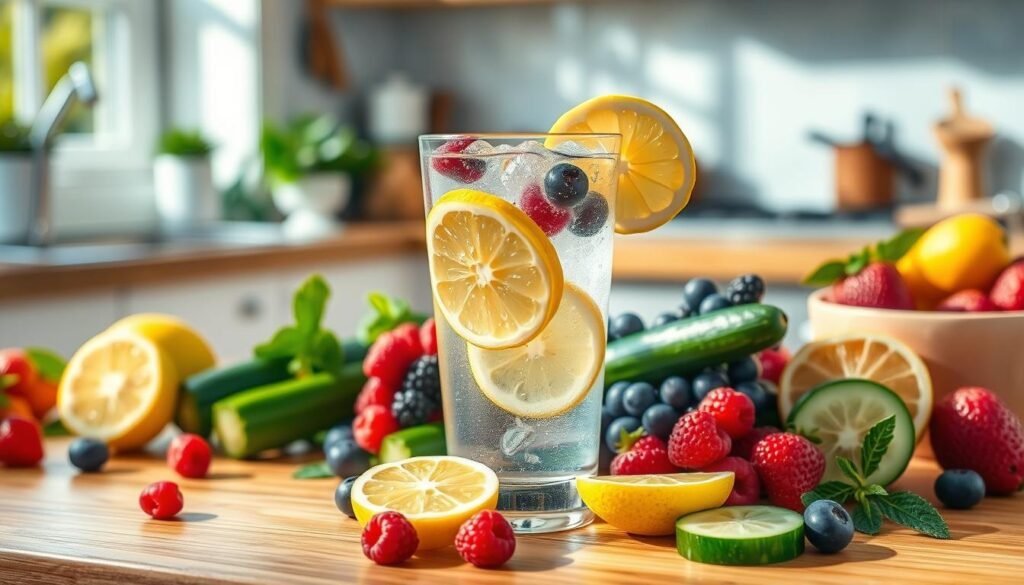
Using Apps to Track Fluid Intake
Keeping track of my hydration is easy with smartphone apps. These apps remind me to drink water and show my progress. They let me set goals based on my activity and the weather.
Our bodies are mostly water, and losing fluid can hurt our thinking skills13. By drinking 3-3.5 liters (men) or 2-2.5 liters (women) of fluids daily, I stay hydrated and support my health13.
Hydration Strategies for Different Situations
Living with diabetes means you need a special plan for staying hydrated. It’s key to manage your fluid intake well, especially in different situations. Let’s look at some good ways to keep hydrated in various scenarios.
Hot weather is tough for people with diabetes. I drink more water when it’s hot. People with diabetes can easily get dehydrated in the heat14. I always carry a water bottle and drink water often during the day.
Working out also requires careful hydration. Losing fluids through sweat is common14. Before, during, and after exercise, I drink water. I also try to work out in cooler places or early in the morning to lose less fluid.
Being sick can make dehydration worse, especially if you have vomiting or diarrhea. In these times, I focus on getting fluids and electrolytes back in balance. I use sugar-free electrolyte drinks or water with a bit of salt.
- Carry a reusable water bottle everywhere
- Set reminders to drink water regularly
- Choose water-rich foods like cucumbers and watermelon
- Monitor urine color – aim for pale yellow
Adults over 65 with diabetes are more likely to get dehydrated14. It’s important to drink plenty of water to stay healthy. By using these tips for different situations, I’ve found it easier to keep my fluid intake in check.
The Role of Food in Hydration for Diabetics
When I manage my diabetes, I’ve found that food is key to staying hydrated. It’s not just about drinking water. The foods we eat also help us stay hydrated. Let’s look at some tips for diabetics on what foods to eat.
Water-Rich Foods to Include in Your Diet
I enjoy adding water-rich foods to my meals. These foods help with hydration and give us important nutrients. Here are some top picks:
- Cucumber (96% water)
- Watermelon (92% water)
- Strawberries (91% water)
- Spinach (91% water)
- Cantaloupe (90% water)
These foods are great for diabetics who need to stay hydrated. They’re low in carbs but high in water, helping to control blood sugar and keep us hydrated.
Balancing Hydration and Carbohydrate Intake
When picking hydrating foods, I watch their carb levels. It’s important to balance hydration and blood sugar. Some fruits and veggies have more carbs than others, so I watch my portions15.
The plate method helps me manage my portions well. I fill half my plate with non-starchy veggies, a quarter with high-fiber carbs, and the last quarter with protein15. This way, I stay hydrated and keep my carb intake right.
“Food is not just fuel, it’s information. It talks to your DNA and tells it what to do. The most powerful tool to change your health, environment, and entire world is your fork.” – Dr. Mark Hyman
Being hydrated with diabetes isn’t just about drinking water. It’s about eating foods that help with hydration and blood sugar control. By choosing water-rich, low-carb foods, we can drink our fill and keep our glucose stable.
Exercise and Hydration for Diabetics
Managing fluid intake is key for diabetics during exercise. As someone with diabetes, I’ve learned that staying hydrated is crucial for stable blood sugar. The American College of Sports Medicine suggests 6 to 8 eight-ounce glasses of water a day16.
To stay hydrated, I drink 16-20 fluid ounces of water before exercise and 8-12 fluid ounces before starting. During my workout, I drink 3-8 fluid ounces of water every 15-20 minutes. If my workout is over an hour, I use a sports beverage16. Men should aim for about 2 liters (8.5 glasses) of fluids daily, while women should aim for 1.6 liters (6.5 cups)17.
After exercising, I make sure to replenish fluids within two hours. I drink 20-24 fluid ounces of water or sports beverage for every pound lost during exercise16. Monitoring my weight before and after workouts helps me figure out how much fluid I lost. For longer workouts, I sometimes choose coconut water or no-added sugar orange juice for their benefits17. Remember, staying hydrated is key for accurate blood sugar checks16.
FAQ
Why are diabetics more prone to dehydration?
Diabetics often get dehydrated because high blood sugar makes the kidneys work hard. They filter and absorb sugar, losing fluids through urine. This leads to frequent bathroom trips and dehydration.
How does dehydration impact blood sugar levels?
Dehydration can raise blood sugar levels by 50-110 mg/dL or more. Even a little dehydration can cause big spikes in blood sugar. It’s crucial for diabetics to stay hydrated.
What are the signs of dehydration in diabetics?
Dehydration signs include feeling thirsty, having a dry mouth and eyes, and headaches. Other signs are dark urine, feeling dizzy, tired, confused, having a different heart rate, and sunken eyes.
Why is staying hydrated important for diabetics?
Staying hydrated helps diabetics control their blood sugar levels. It also protects the kidneys, nerves, and heart. Being hydrated can lower the risk of chronic diseases and help you live longer.
How much water should diabetics drink daily?
Most people need 1.7 liters (6.5 US cups) of water a day, but this can change based on your age, how active you are, the weather, your weight, and any health conditions you have.
What are the best beverages for diabetics to stay hydrated?
The best drinks are water, sparkling water, herbal teas, and unsweetened black tea. You can also have coffee in moderation. Diet soft drinks are okay sometimes, but sports drinks are best used after hard workouts or when you’re sick.
How can diabetics increase their water consumption?
Start by drinking water when you wake up and before meals. Use a reusable water bottle and set reminders. You can also add fruits or herbs to your water for flavor. Apps can help you keep track of how much you drink.
What are some hydration strategies for different situations?
Drink more water when it’s hot and humid. Exercise in cooler weather or early morning. Drink fluids and electrolytes more often if you’re sick with vomiting or diarrhea.
How can food contribute to hydration for diabetics?
Eat foods with a lot of water like cucumber, watermelon, and leafy greens. Remember to watch the carbs to keep your blood sugar stable.
What are the hydration considerations for diabetics during exercise?
Check your blood sugar before, during, and after working out. Drink water at these times and use sugar-free drinks for longer or harder workouts. Adjust your insulin as needed and carry water and quick glucose with you.
